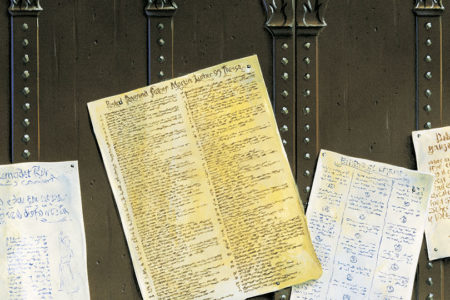Sliding Toward Anarchy
Hosea 7:1-16
It is often said that a picture is worth a thousand words. Yet in this chapter of Hosea, the prophet uses a number of similes and metaphors to paint a vivid picture of Israel’s pursuit of immorality as she set aside God’s law, degenerated, and slid toward anarchy and national disaster. Worse, however, than the nation’s moral decline was the blindness of her leaders, who lacked any conscious awareness of their sin. These factors produced a spirit of anarchy and chaos within the northern kingdom of Israel during the final days before the Assyrian invasion. Little did Israel know that her days were numbered. The mighty Assyrians would soon appear and decimate the nation.
Civil Rebellion
God eagerly looked forward to bringing spiritual healing to Israel, but her recalcitrant involvement in gross immorality made such renewal impossible. The LORD said,
When I would have healed Israel, then the iniquity of Ephraim was uncovered, and the wickedness of Samaria; for they commit falsehood; and the thief cometh in, and the troop of robbers spoileth without (v. 1).
Degeneracy existed everywhere; the country was filled with lying, home invasions, and street crime. Forsaking God’s law had robbed the nation of her faith, honesty, integrity, and material possessions.
Israel had lost sight of the fact that God kept a record of every evil act. “And they consider not in their hearts that I remember all their wickedness; now their own doings have beset them about; they are before my face” (v. 2). Israel was so consumed with wickedness and entangled in sin that she had become callous and indifferent to God’s law, making her impervious to any sense of accountability before God.
In every society, the leadership sets the standards for morality and justice. But Israel’s leaders had succumbed to deeds of wickedness. Their moral corruption and depravity were like leaven, permeating the whole nation from top to bottom. In fact, the king and “princes” (military leaders) rejoiced over the wickedness and lies of their people (v. 3). Israel’s leaders listened with amusement to the vileness of their people’s escapades.
Hosea compares the lust and immoral lack of restraint to the heating of an oven used to bake leavened bread. He said, “They are all adulterers, like an oven heated by the baker, who ceaseth from raising after he hath kneaded the dough, until it be leavened” (v. 4). The baker kindled the fire in his oven the night before, and early in the morning all he needed to do was stoke it until the fire roared. When the flame died down, the oven provided an even heat. The baker would slap the flat, leavened cakes onto the oven walls, and there they would remain until the fermentation in the dough was complete. Then he stoked the fire to an extreme temperature to bake the cakes. In like manner, Israel’s passions simmered until new opportunities for immorality cropped up. Then the fire of their lust burst into flame.
Continuing the metaphor of a baker’s oven, Hosea illustrates how the lust for power had induced the princes of Israel to commit wickedness against their king.
In the day of our king, the princes have made him sick with skins of wine; he stretched out his hand with scoffers. For they have made ready their heart like an oven, while they lie in wait; their baker sleepeth all the night; in the morning it burneth like a flaming fire. They are all hot as an oven, and have devoured their judges; all their kings are fallen; there is none among them that calleth unto me (vv. 5–7).
The celebration described was either the king’s birthday or recognition of his coronation day. The prevailing strategy was to get the king and his court so intoxicated that they became sick with wine and completely incapacitated. Subversive princes, who were invited to feast with their king, burned like a heated oven in their lust to assassinate him. These conspirators waited through the night in anger. In the morning, they ignited their plot and slew him. Then they took over his throne and established their own rule.
Nineteen kings ruled over Israel. Some died natural deaths, but the majority were dethroned or murdered by their successors. Zechariah, Shallum, Pekahiah, and Pekah were all murdered in office. Menahem became a vassal to the Assyrians. The Assyrians imprisoned Hoshea, the last king in Israel. Ironically, through this whole scenario, the LORD said, “there is none among them that calleth unto me” (v. 7). No one called on God to bring stability in Israel as she slid into anarchy.
Chastisement Revealed
God had instructed Israel to remain separate from the surrounding nations (Num. 23:9; Dt. 33:28). However, the ten tribes assimilated themselves and their religion with heathen nations that dwelt nearby. Hosea described this amalgamation as a half-baked cake: “Ephraim hath mixed himself among the people; Ephraim is a cake not turned” (v. 8). In biblical times people baked bread on hot rocks. If they did not turn the bread continually, it would burn to a crisp on one side but remain uncooked dough on the other side. Israel’s intermingling with the Gentile nations left her burned politically and religiously; but in her commitment to the Lord, she remained “uncooked.” A halfbaked cake is good for nothing and must be discarded—so it was with Israel.
This sorry state left Israel like an old man who is weak and susceptible to abuse but who proudly refuses to acknowledge it. Hosea put it well when he wrote, “Strangers have devoured his strength, and he knoweth it not; yea, gray hairs are here and there upon him, yet he knoweth not” (v. 9). Like an old man, Israel bore all the marks of impending death. Her spiritual strength had been diminished by idolatry and her wealth depleted by paying tribute to Assyria. And like an old man unaware of his condition, Israel was blind to her decaying state.
What’s more, “the pride of Israel testifieth to his face, and they do not return to the LORD, their God, nor seek him for all this” (v. 10). God got right in Israel’s face and testified against her immorality, idolatry, and insensitivity toward Him and His Word. Sadly, this rebuke still did not bring the backsliding nation to repent or reverse her position.
In her deteriorating state, Israel pursued protective alliances with Egypt and Assyria. These alliances were described as a “silly dove without heart” (v. 11). When being attacked, a harmless dove will flitter back and forth, confused about what to do to ward off danger. The dove is “without heart,” meaning she lacks the ability to make a rational choice regarding the correct action to take. Like the dove, Israel lacked the ability to make a rational choice. Instead of calling on God for assistance, she irrationally called on heathen nations for help.
While Israel flittered back and forth, making alliances with Assyria and Egypt, God intervened in judgment. The Lord said,
When they shall go, I will spread my net upon them; I will bring them down like the fowls of the heavens; I will chastise them, as their congregation hath heard (v. 12).
Metaphorically, God would come with a fowler’s net, waiting to catch the silly dove of Israel as she flew back and forth in confusion. Israel would not escape judgment. At the right time, God would use the Assyrians to net the nation and carry her into captivity. Israel had received ample warning that her captivity was imminent if repentance was not forthcoming.
The threat of judgment was followed by the Lord’s announcement of destruction:
Woe unto them! For they have fled from me. Destruction unto them! Because they have transgressed against me. Though I have redeemed them, yet they have spoken lies against me (v. 13).
In the past, God had delivered Israel from Egypt and other oppressors bent on her destruction. He was still ready to deliver Israel if the nation would only call on Him for help. Instead, Israel looked to other nations to deliver her from danger. Even worse, Israelites had lied about God’s ability, power, and willingness to protect them. Thus God says, “Destruction unto them!”
During the reign of King Menahem (752-42 B.C.), the Assyrians, led by Tiglath-pileser III, began moving west to enlarge their holdings. In the process, they threatened the northern kingdom of Israel. Menahem knuckled under to the demands of Tiglath-pileser and paid enormous tribute to the Assyrian leader. Later, Israel’s King Pekah joined Syria with plans to plunder Judah. At Judah’s request, Assyria intervened on her behalf and Tiglath-pileser seized the northern kingdom of Israel in 733 B.C.
When the Assyrians invaded Israel, they destroyed the crops used for food and drink. In the midst of their calamity, God said of Israel, “they have not cried unto me with their heart, when they wailed upon their beds; they assemble themselves for grain and wine, and they rebel against me” (v. 14).
The Israelites approached the living God in the same manner as they approached Baal. They howled over the loss of their crops and tried to persuade God to help them by cutting themselves as did the worshippers of Baal (1 Ki. 18:28)—something strictly prohibited by the Mosaic Law (Dt. 14:1).
In His goodness, God had “bound and strengthened their arms” (v. 15) during their time of need; but He received no gratitude for His kindness. In fact, He said “they imagine mischief against me” (v. 15). In disloyalty, Israel treated God as the enemy and plotted the worst kind of evil against Him. Israel’s extreme hostility is all the more horrifying when compared to God’s loving grace and mercy expressed in verse 15.
Finally, Israel’s backsliding and unbelief is compared to a defective bow:
They return, but not to the Most High; they are like a deceitful bow; their princes shall fall by the sword for the rage of their tongue; this shall be their derision in the land of Egypt (v. 16).
Israel took confidence in her ability to defeat her enemies and therefore did not seek God’s help. But her confidence was like a defective bow; when used in battle, it either broke or could not shoot an arrow with power and accuracy. As a result of the nation’s insolence, Israel’s princes would fall by the sword. Even the Egyptians, whom Israel had called on for help, would scorn the nation when they heard of her defeat.
When Tiglath-pileser finally took Israel, he set up Hoshea as king in Samaria. Hoshea acknowledged Assyrian rule for a time but eventually stopped paying tribute and sought an alliance with Egypt in an attempt to overthrow Assyria’s control. This act of rebellion led to a three-year siege by the Assyrians, ending with the captivity of the northern kingdom in 722 B.C. (2 Ki. 17:3–4).
As it was with the Israelites, the moral compass of many Christians today is off course. We, too, need to reexamine our commitment to the Lord and make the needed adjustments while there is still time.






